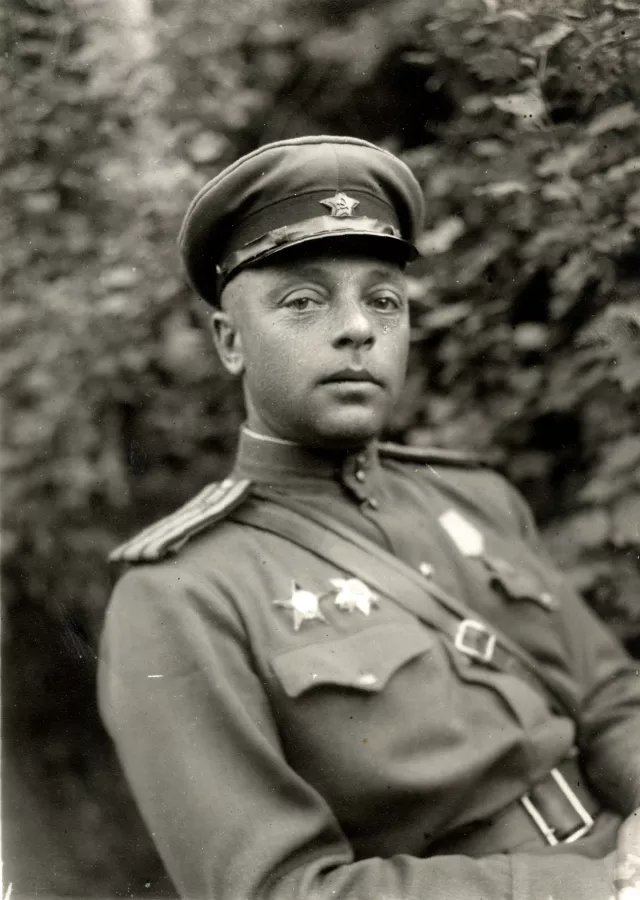This is uncle Vulf, or Vladymir, Sivashinsky, my mother's brother, in Berlin right after the Victory over Germany in May 1945. It is an amateur picture, the photographer found some trees in destroyed Berlin and took uncle's picture set against this background. Even on this happy victorious day my uncle looks strict and serious. He is wearing military decorations on his chest: Patriotic War Decoration of the IInd degree and the Military Red Star Decoration.
My uncle Vulf got married at an early age, when he was 19, to Esphir Berkovna Starobina, a friend of his sister Sima; they studied together at the pharmaceutical technical school. After finishing school Esphir worked in a drugstore. Their first son Mikhail was born in 1924 and in 1940 they had another son, Semyon. They lived with Esphir's parents in a huge communal apartment, which belonged to the Starobins before the Revolution. When the Great Patriotic war broke out, Esphir and Semyon got evacuated to Omsk, Siberia.
Vulf and his elder 17-year-old son Mikhail volunteered to the front. In September 1941 Mikhail perished in the battle near Gatchina in Leningrad region. His father participated in the war, was in Zapolarye, Poland, Hungary, Austria and Germany. He served in chemical forces, was an army officer, a major, with battle awards. He was wounded and partially lost his hearing in the war. After the war he returned to his former job and held high managing positions up to 1958 in the raw material processing industry. Regardless of his bad hearing, his employees loved him very much and simply spoke louder in his presence.
My uncle Vladymir had a sense of humor and liked good literature, the Great Russian poet Pushkin, especially his novel in poetry, Eugene Onegin. Uncle Vladymir told his wife, 'Take your ear-trumpet. Oh, what a big flaw deafness is.' [Editor's note: quoting poet A. S. Griboyedov (1795-1829): Russian playwright, poet and diplomat, contemporary of Pushkin.] He considered Yiddish and Russian his mother tongues. He often spoke Yiddish at home with his wife and his Russian was absolutely correct without the slightest intonational Jewish peculiarity. He remembered Hebrew, the language of the Torah until the end of his life. When during his last year he lay sick in bed, his wife's nephew Yuly came to him to study Hebrew.
Vladymir was a man of high culture, but uncontrollable and hot-tempered. It was good that his hot temper was restrained by the culture. He was a brilliant lector; he gave lectures on chemical methods of scrap processing for specialists. At the end of his life, along with his colleague Slivker, he was occupied with the invention of a machine for technical rags degreasing, they called it cavitator because it's function was based on the hydrodynamic cavitation. They produced a pilot machine, tested it for a long time, but it was never put into mass production. In 1958 Uncle Vladymir obtained incapacity for work and retired. He died in 1963, both he and his wife were buried in the Jewish cemetery in Leningrad.
Vulf Sivashinsky
The Centropa Collection at USHMM
The Centropa archive has been acquired by the United States Holocaust Memorial Museum in Washington, DC.
USHMM will soon offer a Special Collections page for Centropa.
Academics please note: USHMM can provide you with original language word-for-word transcripts and high resolution photographs. All publications should be credited: "From the Centropa Collection at the United States Memorial Museum in Washington, DC". Please contact collection [at] centropa.org.






















